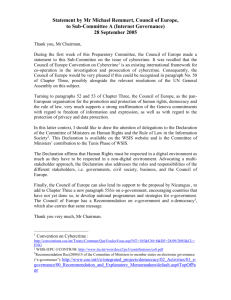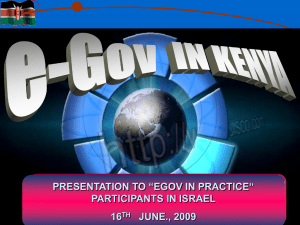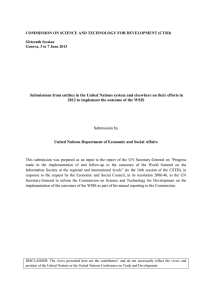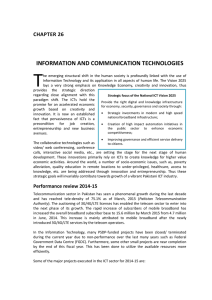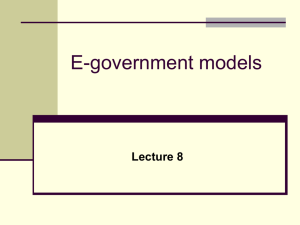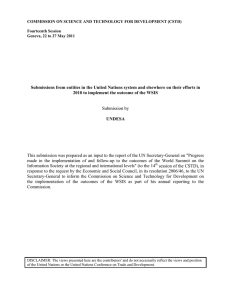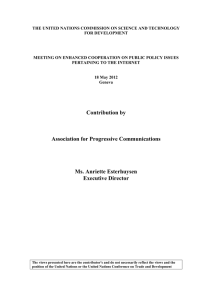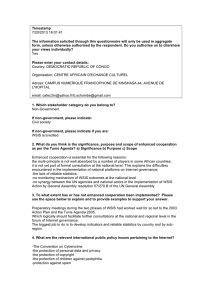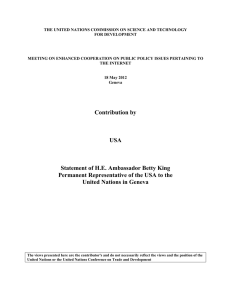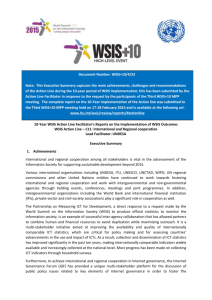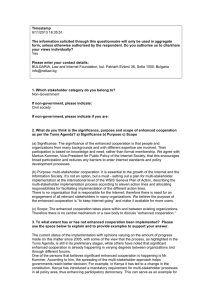COMMISSION ON SCIENCE AND TECHNOLOGY FOR DEVELOPMENT (CSTD) Fifteenth Session
advertisement
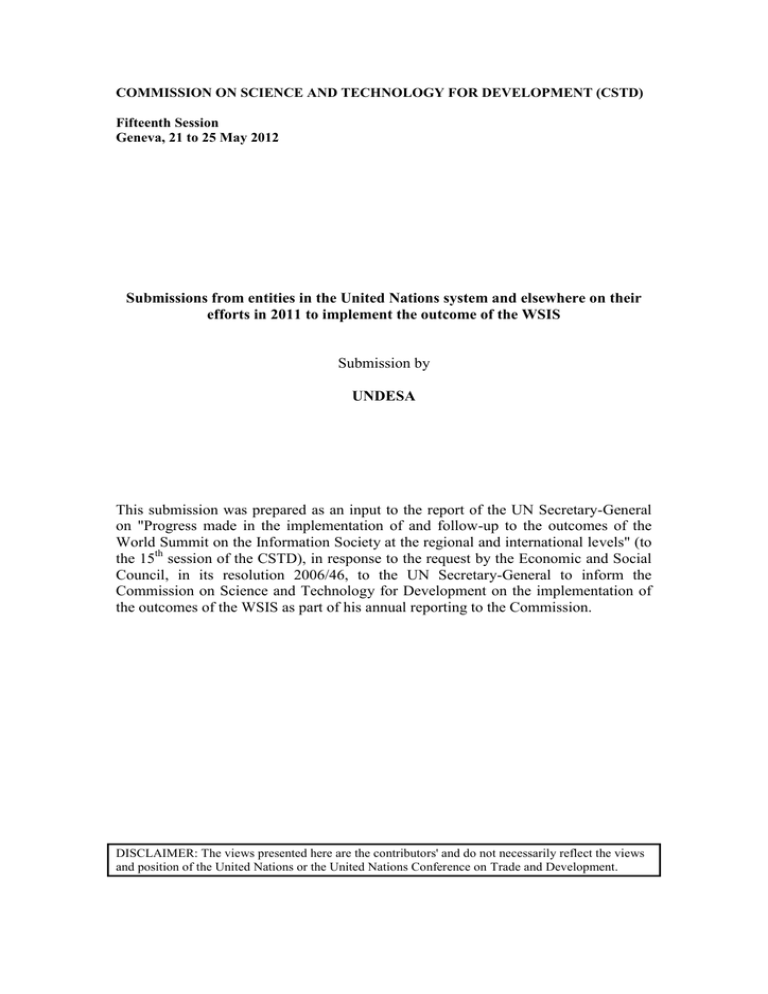
COMMISSION ON SCIENCE AND TECHNOLOGY FOR DEVELOPMENT (CSTD) Fifteenth Session Geneva, 21 to 25 May 2012 Submissions from entities in the United Nations system and elsewhere on their efforts in 2011 to implement the outcome of the WSIS Submission by UNDESA This submission was prepared as an input to the report of the UN Secretary-General on "Progress made in the implementation of and follow-up to the outcomes of the World Summit on the Information Society at the regional and international levels" (to the 15th session of the CSTD), in response to the request by the Economic and Social Council, in its resolution 2006/46, to the UN Secretary-General to inform the Commission on Science and Technology for Development on the implementation of the outcomes of the WSIS as part of his annual reporting to the Commission. DISCLAIMER: The views presented here are the contributors' and do not necessarily reflect the views and position of the United Nations or the United Nations Conference on Trade and Development. UN I T E D N A T I O N S NATIONS UNIES Report on the Implementation of the Outcomes of the World Summit on the Information Society (WSIS) United Nations Department of Economic and Social Affairs (DESA) (January 2011 to December 2011) I. Executive Summary During the reporting period, DESA, as the leading facilitator for Action Lines C1, C7eGov, and C11, the newly elected Vice-Chair of the United Nations Group on the Information Society (UNGIS) and administrator of the IGF1 Secretariat, focused its efforts to ensure the comprehensive exchange of views, information and experiences, to promote policy dialogue and advocacy for the implementation of the World Summit on the Information Society (WSIS) outcomes by a variety of United Nations bodies, governmental and non-governmental stakeholders and partners through a number of modalities and initiatives listed below. As in the past, besides organizing the Sixth Facilitation Meeting of Lines C1, C7eGovernment and C11 of the Geneva Plan of Action and the Tunis Agenda (on 20 May 2011), a Workshop on “Greater Government Transparency and Citizen Engagement to Promote Effectiveness and Accountability in Public Service Delivery” was organized by DESA in Geneva on 19 May 2011, during the 2011 WSIS Forum in cooperation with ITU. Both events served as an enabling platform of WSIS outcomes, for an international and multidisciplinary (including public officials, academia, civil society and private sector stakeholders) group of experts and national practitioners, to share their experiences and exchange practices including the area of egovernment and mobile government, together with strategies for designing, implementing, and evaluating government services. The meetings provided opportunities for participants to interact with speakers to develop new capacities for designing and implementing successful programs and policies in e-government, as well as to create or strengthen international networks of stakeholders and practitioners to ensure the WSIS and MDGs implementation at the international, regional and national levels. With the aim of promoting policy dialogue and supporting the building of policy making capacities and technical skills of government officials and practitioners from developing countries in knowledge management for effective electronic and mobile government, DESA has organized regional workshops that provided a forum for countries to exchange ideas, learn form each other and form e-government networks among themselves. These include: Workshop on “African e-Leadership Capacity-Building” held on 20 June in Tanzania, within the framework of 2011 UN Africa Public Service Day, and Conference on e-Government in Asia and the Pacific in Seoul, Republic of Korea that DESA, through its United Nations Project Office on Governance (UNPOG) organized from 11-13 May 2011. 1 Internet Governance Forum DPADM/UNDESA 30 December 2011 1 In addition, in the course of 2011 more than 15 advisory and technical assistance missions have been initiated and taken place to support governments in implementing their respective e-government strategies or e-strategies that dealt with e-content, citizen-engagement, online services, e-participation, infrastructure development, e-government policies and guidelines, thus bridging the digital divide and institutional frameworks in the following countries:.Bahrain, Brunei Darussalam, Colombia, Indonesia, Jordan, Morocco, Qatar, Republic of Korea, Saudi Arabia, Tanzania, Tunisia and United Arab Emirates. These advisory missions have contributed to empower Member States to strengthen their respective strategies, policies, content development, citizen engagement, a better understanding of e-government, and use of social networking tools, while building their capacities at the national and regional level. DESA continued strengthening its partnership with international institutions and other stakeholders to develop a coherent e-government support mechanism, which includes: partnership with the Government of Colombia for e-Government development in Latin America, partnership with Multilateral Development Banks for e-Procurement, partnership with several universities to develop the UN E-Government Survey, as well as Boston University to provide training for Chief Information Officers (CIOs) and senior e-Government officials. To date, Boston University had delivered four CIO courses (two in Saudi Arabia and one each in Brunei Darussalam and Qatar). There are discussions in place now to have a similar course in Bahrain. In the course of 2011, METER, the Measurement and Evaluation Tool for E-Government Readiness, was further developed by DESA in cooperation with Microsoft Corporation. It is a ready-to-use interactive web-based tool aiming to assist governments to monitor and identify areas for further development within the national e-government environment. Currently in its version 2.5, METER has been used by Bahrain, Brunei Darussalam, Singapore, Iraq, Morocco, Qatar and officials from other countries in assessing areas for further e-Government development. DESA also continued to strengthen the technical capacity of the United Nations Public Administration Network (UNPAN) Online Training Centre with a governance and public administration learning content management system encompassing 11 interactive online capacity-building courses and 15 pdf-based learning materials on various topics in public administration and management under a multi-language environment. The Russian version of the interactive online course 'E-Government Interoperability' and the course 'Citizen Engagement and the Millennium Development Goals' and the pdf Spanish course 'La gestion de las personas en las organizaciones del sector publico' (Human Resources Management in the Public Sector) were launched in 2011. During the reporting period, 811 international practitioners, experts, government officials and etc. enrolled in the interactive courses of the UNPAN Online Training Centre with from those enrolled 638 participants (79%) were completed the courses successfully. In further support of Member States’ efforts to improve performance in public administration, development management and e-governance DESA is working on the development of the United Nations Public Administration Country Studies (UNPACS) to underpin the importance of public sector reform initiatives. The UNPACS aims to provide easy accessible online information in the area of public sector institutional development, public sector human resource management, e-government and mobile government, citizen engagement in managing development, open government data and services, and the use of ICT for public DPADM/UNDESA 30 December 2011 2 administration effectiveness and transparency, innovative practices for public sector development, and an Internet-based shared knowledge platform for information sharing and dissemination. In 2011, DESA finalized the United Nations E-Government Survey 2012 with a focus on egovernment for sustainable development. The Survey presents an updated assessment of egovernment performance of the 193 Member States with a comparative analysis of current trends in four critical areas: (a) Adoption of a whole–of-government approach and its increasing importance for the long-term viability of e-government services and need to effectively address multifacetted challenges facing integrated service delivery; (b) accessibility, digital inclusion of vulnerable groups and challenge of making egovernment to work, particularly for these groups through online public services geared towards addressing these groups’ needs; (c) user take-up as emerging issue, moving beyond the analysis and measurement of “supply-side” of e- government services; and (d) multi-channel service delivery and opportunities for governments to offer new channels to deliver public services to citizens and integrate different channels including offline channels. The underlying theme of the 2012 Survey is the role of e-government for sustainable development, which also serves as inputs for consideration during the United Nations Conference on Sustainable Development to be held in Rio de Janeiro in June 2012. The report argues that increasing usage can help reduce e-service usage divide within countries and foster socially inclusive development; while open data presents opportunities for citizens to freely use, re-use and integrate various sustainable development-related dataset. Since 2006, DESA has been publishing the Compendium of Innovative E-government Practices. This publication contains a compilation of case studies of innovative egovernment solutions, services and applications with elements of transferability and adaptability. In developing this Compendium, DESA aims to provide a venue for promotion and sharing of cost-effective, value-added innovative solutions, to hasten innovation and creating public value for the citizenry and to enable South-South and North-South informationsharing. Volumes I-III of the Compendium has come in three volumes and includes over 300 cases and Volume IV is finalized at the end of 2011. The cases of all volumes are available and searchable through the online database established within the UNPAN. DPADM/UNDESA 30 December 2011 3 In March 2011, DESA organized a consultation on e-procurement in Seoul, drawing on inputs from the World Bank, Asia Development Bank and experts from the Governments of China, Italy, Japan, Korea, Mexico and the Philippines. In October 2011, DESA also organized an Expert Group Meeting on E-Procurement. The outcome has been the decision to build a Knowledge Guide on E-Procurement that will assist member states in improving transparency and accountability. In addition, DESA was invited by the Asian Development Bank and by the Multilateral Development Banks Working Group on E-Procurement to present this idea to Asian and Pacific Government Representatives at the Asia and Pacific Conference on E-Procurement, held in Bali in November 2011, where the initiative was fully supported. The publication: “M-Government: Mobile Technologies for Responsive Governments and Connected Societies” was prepared in collaboration of DESA, ITU and the Organisation for Economic Co-operation and Development (OECD) and provided a prime platform for presenting, exchanging and disseminating, ideas, information on mobile software and hardware applications and services to help governments to address the challenges associated with mgovernment development. The report highlighted the relevance and value of mobile technologies for economic and social impact, examine key principles for becoming agile and ubiquitous, emphasize the importance of policy and governance models, and will assist governments in the process of developing sustainable implementations of m-government and optimizing the range of possibilities for extending the outreach, efficiency and effectiveness of public services DESA remained a key player in the Partnership for Measurement of ICT for Development participating in the Partnership meetings during 2011. As Member of the task Group on E-government Indicators, DESA contributed to the finalization of the Partnership Report on a framework for the development of e-Government indicators based on its considerable work on e-government indicators. The Report presents a set of global indicators for the Member States in e-government and is to be presented to the UN Statistical Commission in 2012. Under the aegis of the Task Group on WSIS, DESA contributed to the joint publication of the Partnership entitled “Measuring the WSIS Targets”. A Statistical Framework which provides a statistical framework for measuring the WSIS targets at the national level. The report, which proposes measurable indicators along with their definitions and model questions, was launched at the WSIS Forum in Geneva in May 2011. DESA continued to support the efforts of the Broadband Commission in 2011 taking note of the work of the Task Force on E-government during 2011 especially as it related to the nexus between broadband and e-government for more efficient and speedy solutions to functioning of government institutions. The GA Resolution A/66/437 on “Information and communications technologies for development” acknowledges the positive trends of e-government among others and stresses the important role of governments in the design of their national public policies and in the provision of public services responsive to national needs and priorities through, inter alia, the effective use of information and communication technologies. DPADM/UNDESA 30 December 2011 4 Global Centre for ICT in Parliament During 2011, DESA and the Inter-Parliamentary Union (IPU) cooperated through the jointly established Global Centre for ICT in Parliament (the Centre) to strengthen the role of parliaments in advancing the Information Society and in contributing to the implementation of the outcomes of the WSIS, and to promote the use of ICT as a means to modernize parliamentary processes and improve inter-parliamentary cooperation. The Centre organized the Fourth Parliamentary Forum on “The Triple Challenge of Cybersecurity: Information, Citizens and Infrastructure” in Geneva, Switzerland. The meeting addressed the particular challenges posed by the illicit use of ICT, such as the safeguarding of citizens in the connected environment; the protection of State information, data and infrastructures; and the transnational response to cybercrime. The Centre provided technical assistance to a large number of parliaments, in particular in the Southern Africa and Caribbean regions, including Angola (March 2011), Mauritius (May 2011), Swaziland (June 2011), Guyana (June 2011), Malawi (June 2011), Zambia (July 2011), Antigua and Barbuda (July 2011), Saint Vincent and the Grenadines (July), Zimbabwe (July 2011), Dominican Republic (August 2011), Barbados (September 2011), Seychelles (September 2011), Mozambique (September 2011), Belize (October 2011), Lesotho (October 2011), Tanzania (November 2011), Sierra Leone (November 2011), Dominica (November 2011), Suriname (November 2011) and Grenada (November 2011). Through the exchange of parliamentary expertise and knowledge, including through south-south cooperation, parliaments were assisted in formulating strategic plans for the use of ICT in Parliament. Through the organization of two workshops held in Chile in January 2011 and Panama in March 2011, the Centre facilitated the establishment of the Exchange Network of Parliaments of Latin America and the Caribbean (ENPLAC) to strengthen cooperation among parliamentary administrations of this region. Among the main capacity-building activities, in August 2011 the Centre organized a skills development activity for parliamentary libraries of Latin America and the Caribbean to enhance their capacity to develop, manage and deliver digital resources. The Centre also prepared two Handbooks which offer guidelines and recommendations for parliamentary staff in the areas of capturing and reporting parliamentary proceedings and use of ICT in parliamentary libraries. In November 2011, the Centre launched the third Global Survey of ICT in Parliaments in preparation for the release of the third issue of the World e-Parliament Report which will track emerging trends and practices on how ICT is being used by parliaments. During 2011, the Centre coordinated its work with the activities of the Africa iParliaments Action Plan, the regional DESA-led initiative that supports the development of highquality and sustainable parliamentary information systems to foster transparency and accountability, and support democratic participation in African parliaments. The Africa i-Parliaments Action Plan has developed Bungeni – Parliamentary Information System an open source suit of applications for the drafting, managing, consolidating and publishing legislative and other parliamentary documents, and the Akoma Ntoso – XML standard for parliamentary, legislative and judiciary documents. The Project has also been instrumental in the establishment and subsequent implementation of capacity building activities of the Africa Parliamentary Knowledge Network (APKN). DPADM/UNDESA 30 December 2011 5 Internet Governance Forum (IGF) The Sixth Annual IGF meeting was held in Nairobi, Kenya on 27-30 September 2011 at the United Nations Office at Nairobi (UNON). It was the first meeting since its mandate was renewed by General Assembly resolution 65/141 of 20 December 2010. Two Open Consultations and Multi-stakeholder Advisory Group meetings were held to set the agenda and themes of the Nairobi meeting as well as continuous online interactions. The main theme was ‘Internet as a catalyst for change: access, development, freedoms and innovation'. More than 2,000 badges where issued to participants making it the most highly attended IGF meeting to date. One hundred and twenty-five governments were represented and 68 international media representatives were accredited. The approximated regional distribution was: African (53%), WEOG (29%), Asian (11%), GRULAC (4%) and Eastern Europe (3%). In order to make participation accessible to all interested Internet users remote participation tools were made available for all main sessions and workshops. Remote hubs in 47 locations where set up providing the means for more than 823 people who had not been able to attend the meeting to participate actively and contribute to discussions. A total of 38 remote participants/panellists had participated via video or audio link and approximately 2,500 connections from 89 countries were made throughout the week. Parallel to the main sessions, 122 workshops, best practise forums, dynamic coalition meetings and open forums were held around the main themes of the forum and the broad mandate of the IGF. Important issues pertinent to Internet policy making such as the role of Internet governance for development (IG4D), providing access and creating diversity, recognizing access to Internet as a human right, providing security and privacy while maintaining openness, recent innovations in critical and Internet resources and their effect on various bodies were discussed during the meeting. Other than main sessions and workshops, more than 40 bilateral meetings and side events were held. Nine Dynamic Coalitions held meetings with topics ranging from Internet rights and freedoms to access for people with disabilities. Core Internet organizations also held Open Forums to inform the participants about their work. The proceedings of the Kenya meeting were reflected in Chair’s summary report. During last year, approximately four new regional and national IGF initiatives were formulated such as the Southern African IGF and IGF Canada. There are currently 17 national and 11 regional IGF initiatives that held independent meetings in their regions. At the IGF meeting national and regional IGF discussed and exchanged views on Internet Governance related issues. DPADM/UNDESA 30 December 2011 6 The IGF Secretariat continued its capacity building and outreach activities through its fellowship and internship program, which had participants from Malawi, Canada, Iran, Kenya, USA and Lithuania. Also the IGF Secretariat participated in several of the regional and National IGF initiatives such as the Asia Pacific Regional IGF (APrIGF), European Dialogue on Internet Governance (EuroDig) and the Southern Africa Internet Governance Forum. Enhanced cooperation on public policy issues pertaining to the Internet The paragraph 35 of the Tunis Agenda for Information Society calls for enhanced cooperation on Internet-related international public policy issues among governments and other stakeholders from the private sector, civil society, the Internet technical community and intergovernmental organizations, in their respective areas of competence and mandate. As per the resolution of the Economic and Social Council 2010/2, DESA convened open and inclusive consultations on public policy issues pertaining to the Internet involving all Member States and other stakeholders; with a view to assisting the process towards enhanced cooperation on international public policy issues pertaining to the Internet. A report on the outcome of the consultations was transmitted to the General Assembly through the Economic and Social Council (A/66/77–E/2011/103). Contributors reflected particularly on the public policy issues of concern, on international cooperation mechanisms to address these issues, and on the role of the United Nations and other entities in facilitating the process towards enhanced cooperation. In its resolution A/66/437 on information and communications technologies for development of 22 December 2011, the General Assembly took note of the consultations organized by DESA. It also invited the Chair of the Commission on Science and Technology for Development to convene, in conjunction with the Commission’s 15th session, a one-day open, inclusive and interactive meeting involving all Member States and other stakeholders; with a view to identifying a shared understanding about enhanced cooperation on public policy issues pertaining to the Internet in accordance with paragraphs 34 and 35 of the Tunis Agenda. II. Lessons learned, obstacles and difficulties encountered and initiatives and important measures needed for future implementation of the Summit outcomes. Global consensus about the importance of electronic and mobile government as components of public governance continues to grow. Communities and citizens around the globe are realizing the role Information and Communication Technologies (ICT) can play in transforming their lives. Governments, like other sectors, are looking to ICT as a key instrument for their own transformation agendas. Whether they are seeking to create new governance processes through citizen engagement initiatives, reduce corruption by providing new levels of transparency and accountability, improve the quality of life of the chronically underserved, or contribute to the green economy by simply making traditional government services more efficient in the use of resources and reducing the carbon footprint, ICT-based strategies are recognized as a powerful tool for transformation. Mobile technology is significantly expanding the capacity of government to deliver citizen- and business-centric services. The most notable DPADM/UNDESA 30 December 2011 7 progress will be in developing countries, which historically have been limited by poor or nonexistent communications infrastructure, which, in turn, have constrained economic development and social improvements One of the current trends in e-government and mobile government development is focused on leveraging technology in support of active and strong citizen and private sector involvement in public service program design and delivery. This trend is enabled by the unprecedented accessibility and openness of data from public administrations around the world and the innovative ways citizens and businesses are getting value from the public services offered through e/m-government. One of the challenges facing governments is to better understand the opportunities ahead of them and the risks involved. One of the challenges governments face in this regard is in identifying reliable indicator sets to inform their efforts. In addition, new planning tools that focus on the public value of e/m-government initiatives are needed, tools that support the efforts of governments to more fully understand the value they seek to create for citizens, the capabilities required to be successful, and the data and methods that will be used to measure outcomes. The other challenge in building effective e-governance is how to employ broadband and other networking technologies to ensure accountability, effectiveness and transparency in public sector governance, by promoting broadband. Government initiatives in this area could further reinforce accountability, strengthen community oversight of resource allocation, reduce corruption, and increase the competitiveness of the procurement processes. However, these developments will also provide countries with more developed levels of e/m government with the opportunity to tackle digital divide related issues which in many of them still remain one of the more critical reasons for the level of e/m-government services uptake which below expectations. Despite the significant results achieved so far in the area of ICT and Parliament there are still challenges. Few parliaments are in the forefront of establishing national ICT policies, as well as national consultative mechanisms, which can benefit their own use of technology and help narrow the digital divide. Most legislators still underestimate their pivotal role in the development of an equitable, people-centred Information Society and are not actively engaged at the national and international level, through the WSIS process, to represent their citizens’ needs and views. Without the active involvement of parliaments on these issues, it will be difficult to establish national and international policies that will encourage the growth and benefits of the modern information society and narrow the digital divide and the democratic deficit. It is generally felt by the internet community that the IGF has found its place in the constellation of international institutions dealing with Internet related public policy issues. There was some scepticism to begin with, but now there is a broad recognition that there is a complementarity of functions between the IGF and international organizations and institutions dealing with Internet related policy issues. The increasing participation in the IGF’s events is proof that the continuing growth of the Internet, across all technology platforms, requires ongoing open policy dialogue amongst all stakeholders together on an equal footing. Evidently, the vital discussions that occur during the IGF’s events continue to contribute to and shape the development agendas such as the Rio+20 process for sustainable development and respective national development initiatives. The growth in the number of Internet users worldwide DPADM/UNDESA 30 December 2011 8 substantiates the use of Internet as a medium to achieve the Millennium Development Goals. The Internet could foster economic growth, freedoms and innovation; for example through improved education and knowledge while empowering citizens. The WSIS outcomes underline the need to build an inclusive global Information Society with cooperation and partnership among all stakeholders and address international Internet governance in a coordinated manner. The IGF and enhanced cooperation processes have shown the need for a concerted effort to ensure the effective and meaningful participation of all stakeholders, especially from developing countries, in their respective roles and responsibilities. A major challenge is to effectively bridge the gap between developing country stakeholders facing more participation constraints and others with more resources to participate in Internet governance. In the end, the participatory and inclusive principle of the WSIS is an important foundation for enhanced cooperation. And Internet governance needs to be improved in line with this principle in order to successfully harness the ICT potential for development. DPADM/UNDESA 30 December 2011 9
